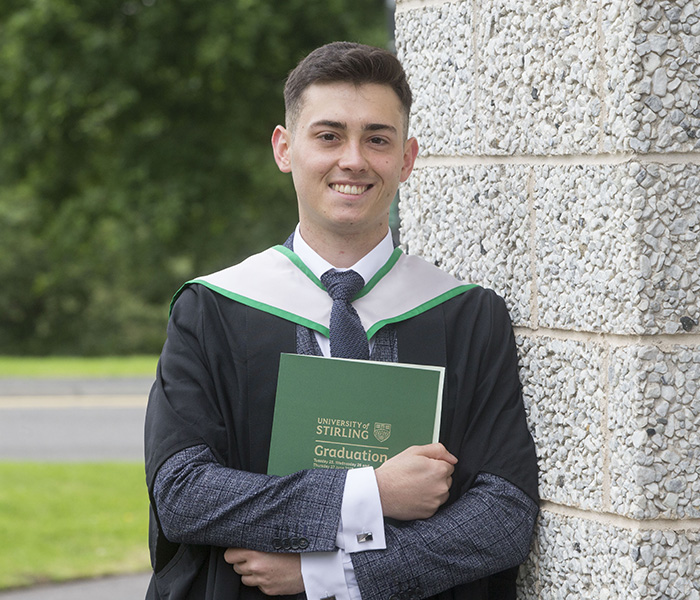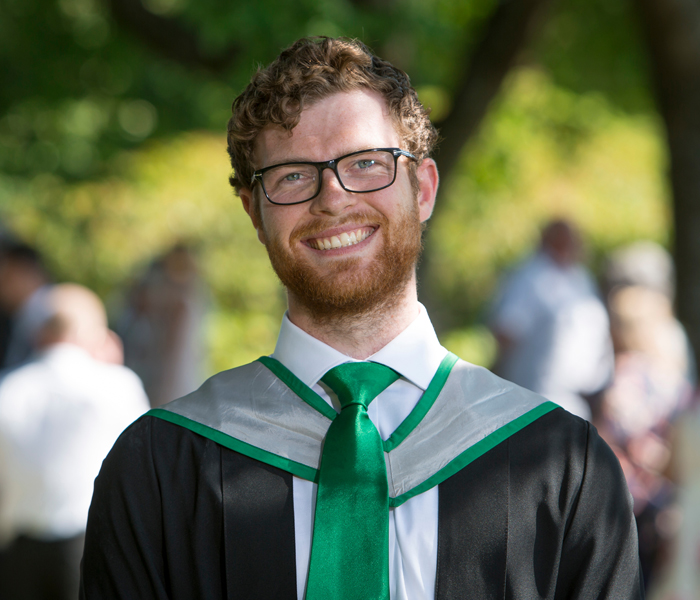BSc (Hons) Sport and Exercise Science
Scotland’s University for Sporting Excellence provides the perfect place for you to study and kick-start your career in sport with our Sport and Exercise Science course.
Key facts
- Award BSc (Hons)
- Start date September 2024
- Duration 48 months
- Mode of study full time, part time
- Delivery on campus
- UCAS Code CC61
- Study abroad opportunities
Overview
Become a Sport and Exercise scientist with our BSc Sport and Exercise Science degree and you can transform lives and sporting careers.
As Scotland's official University for Sporting Excellence, we place Sport and Exercise Science at the heart of everything we do. We prepare athletes for success on the world stage and improve the health of the nation through physical exercise. It's why we're 1st in Scotland for sports research with 80% of our research in Sport and Exercise Sciences classed as world leading or internationally excellent (REF2021).
Study our BSc Sport and Exercise Science degree and you'll learn from our experts in sport and exercise physiology, psychology, biomechanics, nutrition, genetics, medicine, health and physical activity.
Our research and performance analysis laboratories enable you to develop your scientific and practical skills in a world-class learning environment. Our course will prepare you for the many career opportunities available in Sport and Exercise Science. Our research ranges from the molecular to the whole body level.
Our campus features a 50m swimming pool, ten tennis courts and seven sports pitches all on site. The Times and Sunday Times Good University Guide named Stirling as the Sports University of the Year in 2020. We have strong partnerships with many national governing bodies of sport and other sporting organisations, some of which are based on campus. We also work alongside community sport and active lifestyle organisations.
Top reasons to study with us
Professional accreditation
Our BSc Sport and Exercise Science degree is endorsed by the British Association of Sport and Exercise Sciences (BASES).
Entry requirements
Year 1 entry – Four-year honours
SQA Highers
AABB
GCE A-levels
BBB
IB Diploma
30
BTEC (Level 3)
DDM
Essential subjects
To include one of Biology, Chemistry, Mathematics or Physics.
Essential subjects must have been taken within the last five years to ensure your required subject knowledge is current. Recent work experience can be taken into consideration in place of a formal qualification.
Widening access students
Widening access students may be eligible for an adjusted offer of entry. To find out if this applies to you go to our widening access pages.
Care-experienced applicants will be guaranteed an offer of a place if they meet the minimum entry requirements.
Other Scottish qualifications
Scottish HNC/HND
Year one minimum entry - Bs in graded units.
Access courses
University of Stirling access course - for mature students only. You must pass the course with 50% or above.
SWAP access course - for mature students only.
Email our Admissions Team for advice about other access courses.
Foundation Apprenticeships
Considered to be equivalent to 1 Higher at Grade B
Essential subjects
To include one of Biology, Chemistry, Mathematics or Physics.
Essential subjects must have been taken within the last five years to ensure your required subject knowledge is current. Recent work experience can be taken into consideration in place of a formal qualification.
Other qualifications
English, Welsh and Northern Irish HNC/HND
Merits and Distinctions
English, Welsh and Northern Irish access courses
Access to Higher Education - 60 credits, minimum 45 at QCF Level 3, pass at 60% or above.
Essential subjects
To include one of Biology, Chemistry, Mathematics or Physics.
Essential subjects must have been taken within the last five years to ensure your required subject knowledge is current. Recent work experience can be taken into consideration in place of a formal qualification.
International entry requirements
Advanced entry
Year 2 entry
Entry into Year 2 may be possible depending on your HNC/HND course. To find out more go to our articulation pages.
Other qualifications
Advanced entry may be possible depending on your qualifications. For more information, contact our Admissions Team at admissions@stir.ac.uk.
English language requirements
If English is not your first language you must have one of the following qualifications as evidence of your English language skills:
- IELTS Academic or UKVI 6.0 with a minimum of 5.5 in each sub-skill.
- Pearson Test of English (Academic) 60 overall with a minimum of 59 in each sub-skill.
- IBT TOEFL 78 overall with a minimum of 17 in listening, 18 in reading, 20 in speaking and 17 in writing.
See our information on English language requirements for more details on the language tests we accept and options to waive these requirements.
Pre-sessional English language courses
If you need to improve your English language skills before you enter this course, our partner INTO University of Stirling offers a range of English language courses. These intensive and flexible courses are designed to improve your English ability for entry to this degree.
Find out more about our pre-sessional English language courses
Course details
Our BSc Sport and Exercise Science degree is delivered jointly by the Faculty of Health Sciences and Sport and the Faculty of Natural Sciences, combining a wide range of expertise to ensure an unrivalled student experience.
The course provides you with the knowledge and experience to become a sport and exercise scientist and work in areas such as sport, health or science disciplines, or to pursue a career in research or teaching.
Modules
The module information below provides an example of the types of course module you may study. The details listed are for the academic year that starts in September 2024. Modules and start dates are regularly reviewed and may be subject to change in future years.
Course details
Teaching
The University of Stirling achieved five stars for teaching in the QS Stars University Ratings 2024. In addition to conventional lectures, seminars, tutorials, workshops and laboratory practical sessions, web-based technology is used to support the teaching course.
Assessment
Assessment is by a combination of coursework, group project work, group and individual presentations and examination.
Mode of study
Full-time (three modules per semester).
Part-time (one or two modules per semester).
Flexible learning
Our flexible degree structure means you can study the following modules from the BSc (Hons) Sport and Exercise Science individually as stand-alone continuing professional development (CPD) short courses:
Study abroad
You have the opportunity to study for a semester abroad through Stirling's well-established connections with several international universities.
Contact
Fees and funding
Fees and costs
| Academic year: | 2023/24 | 2024/25 |
|---|---|---|
| Scottish students | £1,820 | £1,820 |
| Students from England, Wales, Northern Ireland and Republic of Ireland | £9,250 | £9,250 |
| International students (including EU) | £20,300 | £21,300 |
Scottish students
This fee is set by the Scottish Government and is subject to change.
Although you’re liable for annual tuition fees, if you are domiciled in Scotland you can apply to the Student Awards Agency for Scotland (SAAS) to have your tuition fees paid by the Scottish Government on your behalf.
You will be charged the annual tuition fee each year when you enrol.
If you need to take additional modules or resit modules, you will be liable for an additional fee.
For more information on courses invoiced on an annual fee basis, please read our tuition fee policy.
Students from England, Wales, Northern Ireland and Republic of Ireland
This tuition fee may be subject to change depending on guidance provided by the UK Government.
You can apply for financial assistance, including a loan to cover the full cost of your tuition fees, from your relevant funding body. Students from the Republic of Ireland are eligible for a tuition fee loan of up to £9,250 from the Student Awards Agency for Scotland (SAAS).
We also offer additional funding – such as our Honours Year Scholarship – for students from England, Wales, Northern Ireland and Republic of Ireland. See our funding opportunities section below for more information.
You will be charged the annual fee each year when you enrol. Your fees will be held at the same level throughout your course.
If you need to take additional modules or resit modules, you will be liable for an additional fee.
For more information on courses invoiced on an annual fee basis, please read our tuition fee policy.
International students (including EU)
Eligible students will automatically receive a scholarship worth between £8,000-£30,000 over the duration of your course. See our range of generous scholarships for international undergraduate students.
You will be charged the annual fee each year when you enrol. Your fees will be held at the same level throughout your course.
If you need to take additional modules or resit modules, you will be liable for an additional fee.
For more information on courses invoiced on an annual fee basis, please read our tuition fee policy.
Additional costs
There are some instances where additional fees may apply. Depending on your chosen course, you may need to pay additional costs, for example for field trips. Learn more about additional fees.
Funding
Sports scholarships
Our International Sports Scholarship Programme is one of the largest high-performance sports programmes in the UK.
See what funding opportunities and loans are available to help you with tuition and living costs.
Students from Scotland
Find funding opportunities for Scottish students.
Students from England, Wales, Northern Ireland and Republic of Ireland
Eligible students will automatically receive our Undergraduate Welcome Scholarship, Undergraduate Merit Scholarship, and our Honours Year Scholarship, which are worth between £1,000 and £9,250.
International students
Eligible international students will automatically receive a scholarship worth between £8,000-£30,000 over the duration of your course. Find funding opportunities for international students.
Cost of living
If you’re domiciled in the UK, you can typically apply to your relevant funding body for help with living costs. This usually takes the form of student loans, grants or bursaries, and the amount awarded depends upon your personal circumstances and household income.
International (including EU) students won’t normally be able to claim living support through SAAS or other UK public funding bodies. You should contact the relevant authority in your country to find out if you’re eligible to receive support.
Payment options
We aim to be as flexible as possible, and offer a wide range of payment methods - including the option to pay fees by instalments. Learn more about how to pay.
After you graduate
Students who graduate from our BSc Sport and Exercise Science degree are prepared for many career opportunities working in sport, exercise, science and beyond. Employers who have benefitted from Stirling graduate expertise include local authorities, commercial and voluntary sport organisations and governing bodies of sport. Some graduates have gone on to postgraduate taught (Masters/MSc) and research degrees (MPhil/PhD).
Discover Uni
Discover Uni provides official data on each university's undergraduate courses, including satisfaction scores from the National Student Survey, details of graduate jobs and salaries, and other key information for prospective students.
What our students said
Scotland
BSc (Hons) Sport and Exercise Science
Read Danielle's storyI wanted to continue swimming whilst studying and knowing Stirling was the University of Sporting Excellence made me want to study here.

South Africa
BSc (Hons) Sport and Exercise Science
Read Markus's storyThe ability to shape your own career using the skills taught at Stirling is such a valuable asset

Northern Ireland
BSc (Hons) Sport and Exercise Science
Read James's storyI was initially attracted to the University of Stirling due to the world renowned reputation for sports and exercise science, alongside amazing sports facilities. Once I came to the open day and saw the campus, I knew where I’d be going!
Flexible study
This course is not available as a combined degree.

